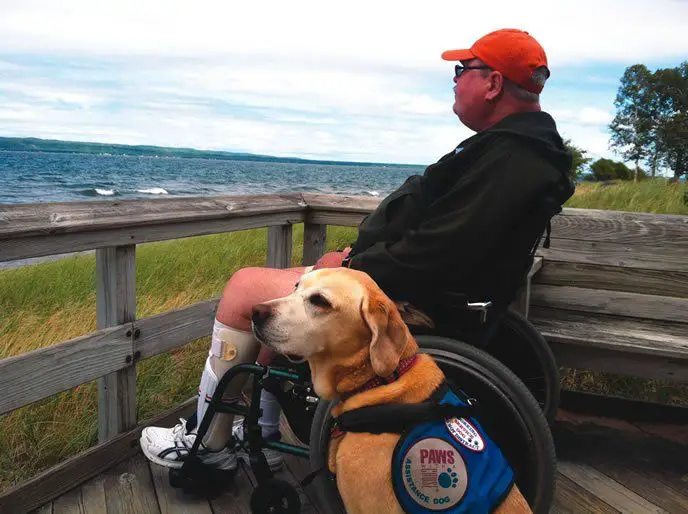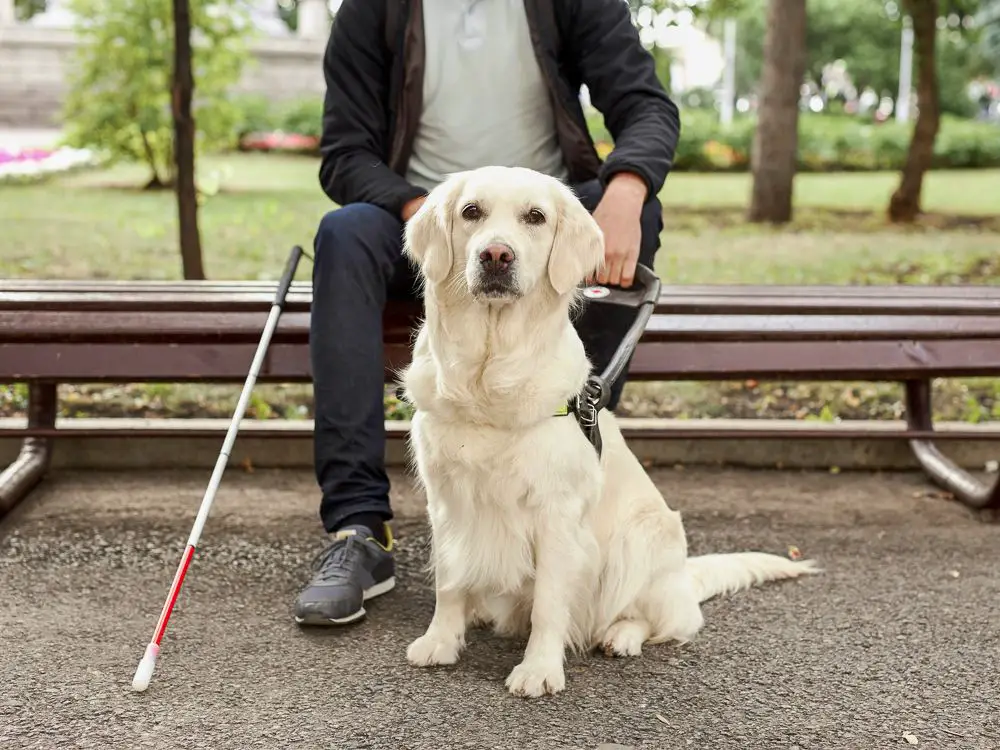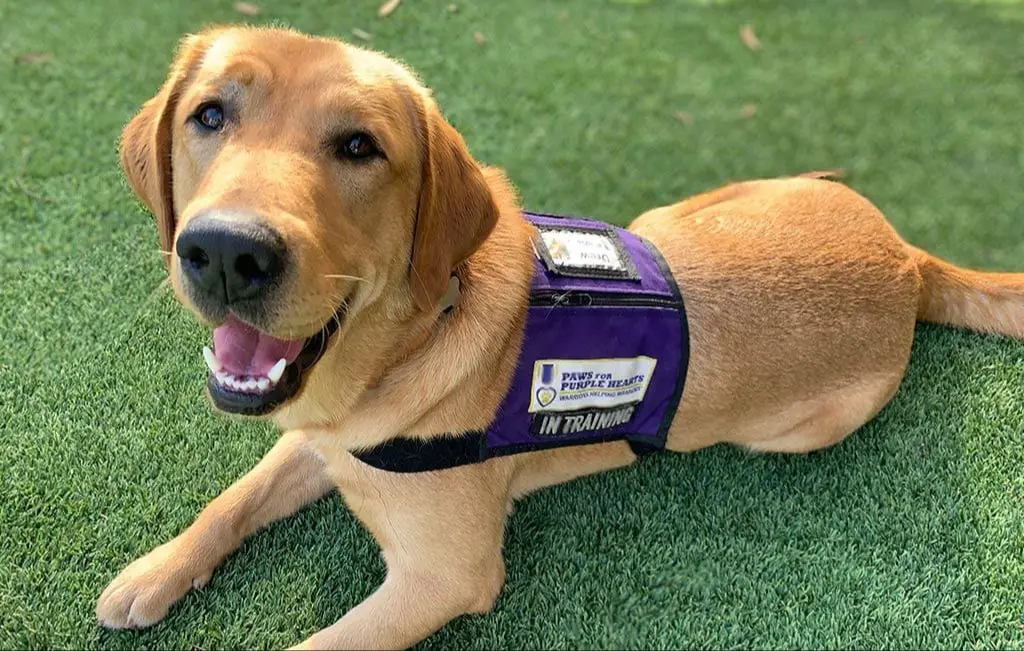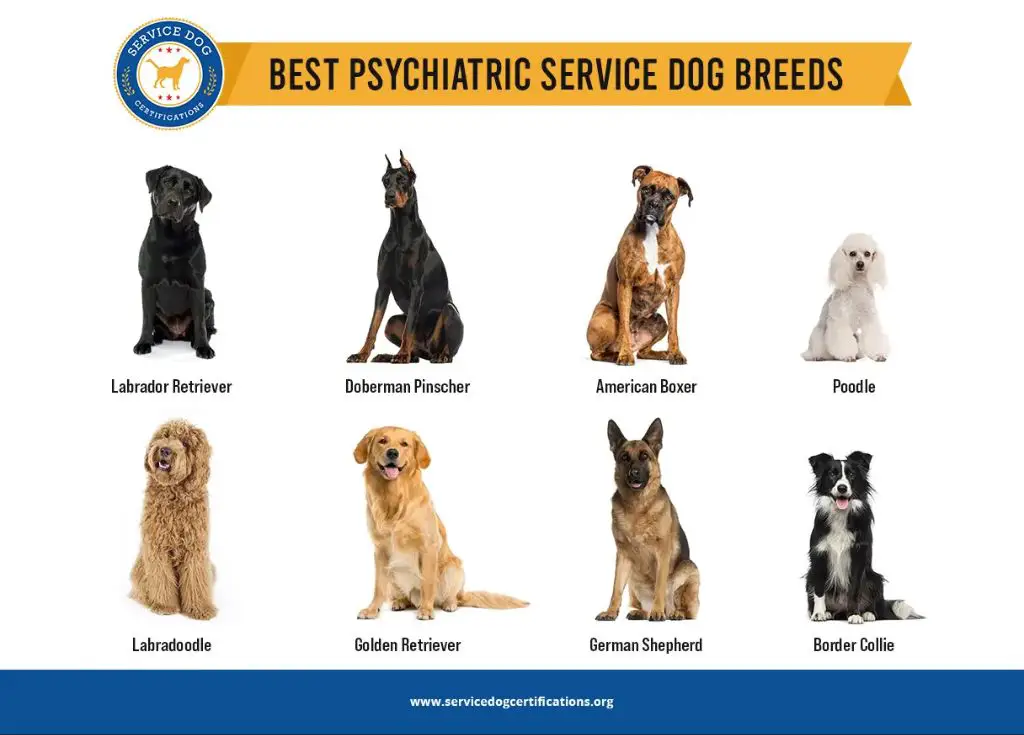Introduction
It is generally illegal under the Americans with Disabilities Act (ADA) to ask someone if their dog is a service animal or to request documentation for their service dog. There are a few key reasons why:
- Service dogs have special legal protections under the ADA that allow them access rights. Business owners cannot refuse them entry or treat them as pets.
- Asking personal questions about someone’s disability or demanding proof can be humiliating or harassing for disabled handlers.
- Service dogs should be identifiable through their behavior, specialized equipment, and the handler’s explanations.
- Requiring papers could prevent legitimate teams from full public access rights guaranteed under the ADA.
While well-intentioned, asking for service dog credentials places an unfair burden on a disabled person and is not allowed in most situations under federal law.
Legal Protections for Service Dogs

The Americans with Disabilities Act (ADA) provides federal protections for people with disabilities who use service dogs. According to the ADA, service dogs must be allowed access to all public places and workplaces where members of the public, program participants, clients, or customers are allowed.
Some key laws under the ADA regarding service dogs include:
- Service dogs must be permitted in all areas open to the public or to customers. This includes restaurants, hotels, taxis, and anywhere else the public is allowed (source: https://www.ada.gov/topics/service-animals/).
- Service dog users cannot be charged extra fees or deposits at places like hotels or airlines (source: https://www.servicedogcertifications.org/ada-service-dog-laws/).
- Service dogs must be under the control of the handler, such as via leash or harness, unless it interferes with the dog’s work (source: https://www.ada.gov/resources/service-animals-2010-requirements/).
The ADA provides protections to ensure service dogs can assist their handlers without discrimination. Businesses and public places that violate these laws can face penalties and legal consequences.
Privacy and Etiquette
It is generally considered inappropriate and an invasion of privacy to ask someone about the details of their disability just because they have a service dog. Service dogs assist people with many different kinds of disabilities, including those that may not be visible. According to the U.S. Department of Justice, “People with disabilities who use service animals cannot be isolated from other patrons, treated less favorably than other patrons, or charged fees that are not charged to other patrons without animals” (Frequently Asked Questions about Service Animals and the ADA).
The ADA prohibits requiring documentation, such as proof that the dog has been certified, trained, or licensed as a service animal, as a condition for entry. Businesses can only ask two questions: 1) Is the dog a service animal required because of a disability? and 2) What work or task has the dog been trained to perform? Businesses cannot require proof of the handler’s disability or ask about the nature of the person’s disability (Can You Legally Ask For Proof of a Service Dog?).
How to Identify a Service Dog
While service dogs are not required to wear vests or have official identification, there are some signs that can help you identify a legitimate service dog:
- The dog wears a harness, vest, or pack that may indicate it is a working dog.
- The dog heels closely next to the handler and is attentive to them.
- The dog behaves calmly and does not bark, sniff people, or wander around on its own.
- The handler maintains control of the dog at all times.
According to the Americans with Disabilities Act (ADA), businesses can only ask two questions to determine if a dog is a service animal – 1) Is the dog a service animal required for a disability? and 2) What work or task has the dog been trained to perform? The ADA prohibits any further inquiries or asking for documentation.
When You Can Ask Questions
In most situations, you should not ask if the dog is a service animal or ask to have proof that the dog is a service animal. According to the ADA, the only two questions a staff member can ask are:

- Is the dog a service animal required because of a disability?
- What work or task has the dog been trained to perform?
You cannot ask about the person’s disability, require medical documentation, or ask that the dog demonstrate its ability to perform the work or task.
However, if the dog is out of control and the handler does not take effective action to control it, staff may ask the person to remove the dog from the premises. For example, if a dog barks repeatedly, growls at other patrons, or behaves aggressively, staff can request its removal. They may not make assumptions or apply stricter rules for service animals than other visitors.
Citations:
https://www.ada.gov/resources/service-animals-2010-requirements/
https://www.thewildest.com/dog-lifestyle/what-questions-can-you-ask-about-a-service-dog
Penalties for Violations
There are legal penalties for improperly questioning or denying access to service dogs. Under the Americans with Disabilities Act (ADA), it is illegal to ask about a person’s disability or demand documentation for a service dog, with limited exceptions. Violations can result in lawsuits and fines.
The ADA permits fines of up to $75,000 for the first violation and $150,000 for subsequent violations. There have been cases where businesses had to pay thousands in legal fees and damages for refusing service dogs. While most lawsuits settle out of court, the financial costs and reputational damage can be substantial.
Even well-meaning but inappropriate questioning can lead to penalties if it’s frequent or egregious enough to interfere with access rights. However, first-time minor issues may result in a warning letter or voluntary compliance first before fines are imposed.
Alternatives to Asking
While it’s normal for businesses to be curious about whether an animal is a legitimate service dog, the law protects service dog handlers from having to disclose their disability or provide proof. However, there are some alternatives to directly asking if a dog is a service animal that allow you to welcome service dogs appropriately:
Focus on the dog’s behavior, not certification. If the dog is well-behaved, not disruptive, and stays by their handler’s side, treat them as you would any service dog, regardless of vest or paperwork.

Avoid questioning the handler’s disabilities or need for the dog. Disabilities can be invisible, so don’t judge based on appearance alone.
Let the handler know upfront that service dogs are welcome. This creates a welcoming environment.
Ask “How can I help you?” or “How can I make your experience better?” This allows the handler to mention any accommodations without probing into private medical details.
Train staff on service dog laws and proper etiquette like avoiding touching or distracting service dogs. This prevents issues.
Focus on accommodating service dogs just like any other accessibility need. Make reasonable modifications to your policies and procedures as required by law.
If an ill-behaved “service dog” is disruptive, follow regular policies on removing misbehaving patrons and dogs, service animal or not.
Accommodating Service Dogs
Under the Americans with Disabilities Act (ADA), businesses and organizations that serve the public must allow people with disabilities to bring their service animals onto the premises. Service animals must be permitted in all areas open to the public or customers. This federal law overrides any state or local laws that may prohibit animals in public places.
The ADA specifies that service dogs must be harnessed, leashed, or tethered unless those devices interfere with the service animal’s work or the individual’s disability prevents using them. In that case, the individual must still be able to control the animal through voice, signal, or other effective means.
Businesses and organizations are not allowed to ask for proof that the animal is a service dog. They also cannot require special ID cards for the dog or ask about the person’s disability. However, staff may ask the following questions:
- Is the dog a service animal required because of a disability?
- What work or task has the dog been trained to perform?
The ADA prohibits businesses from charging fees for accommodating service animals. Furthermore, people with service dogs cannot be isolated from others or treated less favorably.
Reasonable accommodations may include simple adjustments such as designating employee-only areas that are off-limits to service dogs. However, businesses should train staff on how to interact appropriately with service dog teams.
Sources:
ADA Requirements: Service Animals
Taking a Service Animal to Work
Service Dog Misconceptions
There are many common myths and misconceptions about service dogs. Here are some of the most prevalent ones:
Myth: All service dogs must be labradors or golden retrievers.
Fact: There are no restrictions on what dog breeds can be service dogs. Any breed, including mixed breeds, can be trained as a service dog. The most important factors are temperament and aptitude. Small dog breeds like poodles, corgis, and cavalier king charles spaniels can make excellent service dogs for certain tasks 1.
Myth: Service dogs must be wearing vests or tags identifying them.
Fact: There are no legal requirements for service dogs to wear vests or special ID in most public places. The dog’s trained behaviors, not identification or equipment, determine whether they legally qualify as a service dog 2.
Myth: Service dogs must be professionally trained.

Fact: Many owners succeed in training their own service dogs. As long as the dog is trained to perform specific tasks to assist their disabled handler, they can qualify as a service dog.
Conclusion
When considering if you should ask someone if their dog is a service animal, it’s important to understand the legal protections service dogs have, as well as the right to privacy for those with disabilities. There are a few tactful ways to identify if a dog is a service animal without directly asking, such as looking for a vest or harness with identification patches. But in most cases, it’s best not to ask unless absolutely necessary. Instead, focus on accommodating service dogs as required by law. Remember that service dogs are highly trained working animals, not pets, so it’s important to treat them with the same respect as a wheelchair or cane. The key takeaway is to avoid interfering with or distracting service dogs and their handlers unless you have a legitimate reason permitted by law. If you educate yourself on service dog laws and etiquette, you can avoid uncomfortable situations or legal penalties, while supporting those with disabilities.
The bottom line is you generally should not ask someone if their dog is a service animal. Be respectful, follow the law, and accommodate service dogs whenever appropriate. This ensures we build a society that is inclusive and accessible.